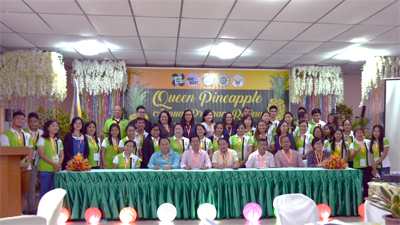 BAYBAY CITY, Leyte – A program is aiming to increase and stabilize the income of at least 3,500 marginalized and subsistent Queen Pineapple farmers in Bicol and Eastern Visayas.
BAYBAY CITY, Leyte – A program is aiming to increase and stabilize the income of at least 3,500 marginalized and subsistent Queen Pineapple farmers in Bicol and Eastern Visayas.
Titled “Enhancing Productivity and Marketability of Queen Pineapple Program,” the P31 million research program is funded by the Philippine Council for Agriculture, Aquatic and Natural Resources Research and Development of the Department of Science and Technology (DOST-PCAARRD).
The program falls under the Council’s National R&D Program on Queen Pineapple. It involves plant selection of superior quality, production of high quality and sufficient planting materials, planting density regulation, pest management, by-product utilization, and policy formulation on fruit grading and trading.
Experts and researchers from VSU, Camarines Norte State College (CNSC), and Department of Agriculture Regional Field Office 5 compose the Program Team.
Optimizing micropropagation technique
The program’s first component project focuses on improving the productivity and quality of Queen Pineapple through optimizing its micropropagation technique. It explores the use of two methods of Queen Pineapple micropropagation: direct organogenesis and somatic embryogenesis.
Direct organogenesis involves regeneration of the plant tissues (explants) into plantlets. Explants may consist of pieces of organs of plants, such as roots and leaves. Somatic embryogenesis is an in vitro process in which somatic cells or tissues develop into differentiated embryos for plantlet development. The in vitro process occurs in a laboratory or in a controlled environment.
With somatic embryogenesis, one explant can produce up to 10,000 plantlets of Queen Pineapple compared with only 5–10 planting materials derived from one plant through the conventional propagation materials such as suckers, crown, and slips.
This technology is also considered a promising intervention as it can produce ready-to-plant seedlings eight months earlier than the traditional propagation.
The use of somatic embryogenesis enabled the team to achieve 200% of the targeted volume of production of planting materials, hence the advice of the technical review panel to develop a plan to make efficient use of the excess volume of planting materials produced.
Characterization and selection of accession
Another project under the program will characterize the existing Queen Pineapple populations and will select accessions with desired traits like high yield, high market acceptability, and suitability to processing, among many other qualities.
The program team reported that the conservation site for selected Queen Pineapple plants has already been identified in Leyte, while that in Camarines Norte has long been established.
An information material featuring cultural management practices of Queen Pineapple was also produced to guide farmers. Included in the material is the recommended planting density of Queen Pineapple as optimized in the program.
The program team also profiled the major existing and emerging pests and diseases of the crop in the two provinces and evaluated the potential sustainable management practices.
They reported the prevalence of Pink Pineapple Mealybugs, Phytophthora heart and fruit rot disease, and plant parasitic nematodes such as Rotylenchulus sp. and Helicotylenchus sp. in Leyte and Camarines Norte. To address this, the team is currently evaluating a group of arthropod natural enemies and endophytic fungi as potential biological control agents.
Product development from Queen Pineapple Wastes
Another project component aims to develop various products from Queen Pineapple wastes as coal feedstock and bran as feed supplement for native chicken. The charcoal briquettes produced are now being tested for market acceptability while the Queen Pineapple bran and rice bran feed mix has already been used for actual feeding to chicken. The results of the sensory evaluation of the chicken used in the study are expected to be delivered this year.
The program team also recommended policy interventions after evaluating the grading system of Queen Pineapple in Camarines Norte. The team drafted provisions on the trading ordinance of Labo, Camarines Norte, which aims to help the farmers in proper and systematic trading and pricing of their produce.
Once implemented, the team hopes that other Queen Pineapple growing municipalities in Camarines Norte and Leyte will follow suit.
All these initiatives are being implemented as comprehensive techniques to sustain the production of the fruit crop and to enhance its marketability.
After the program review, the participants visited the Queen Pineapple tissue culture laboratory, nursery, and experimental site in VSU Campus as well as the project site in Javier, Leyte.
